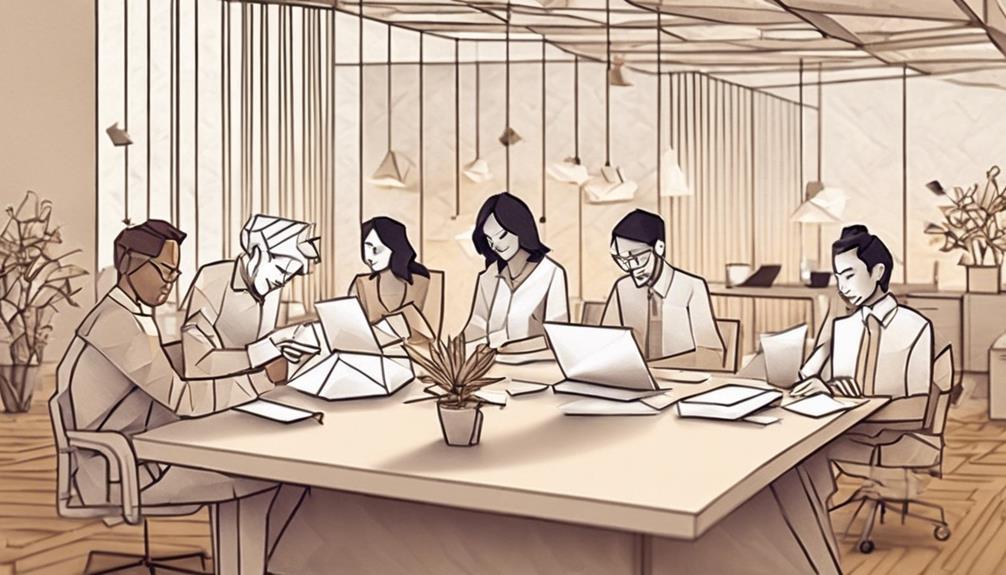Establishing a foundation of trust and understanding in our teams is crucial for effective collaboration and innovation. We start by being honest and transparent, which builds credibility and avoids conflicts. Open dialogue encourages strong relationships and guarantees everyone feels safe to share their thoughts. Active listening, using clear messaging, and recognizing non-verbal cues all strengthen communication. Team-building activities like icebreaker games and group problem-solving tasks help break down barriers and foster cooperation. Keeping our promises and maintaining transparency guarantees we remain reliable and credible. By focusing on these steps, we'll see improved collaboration and deeper connections within our team.
Key Takeaways
- Foster open dialogue to create a safe space for sharing thoughts and building mutual understanding.
- Demonstrate honesty and transparency in all communications to establish credibility and avoid conflicts.
- Engage in active listening by paraphrasing, reflecting emotions, and using clarifying questions to strengthen relationships.
- Participate in team-building activities like icebreaker games and group problem-solving tasks to deepen trust and collaboration.
- Consistently deliver on promises to build a reputation of reliability and maintain credibility in relationships.
Importance of Trust in Teams
Trust in teams is essential because it fosters collaboration, innovation, and high performance. When we trust each other, we're more likely to share ideas without fear of judgment. This openness leads to better problem-solving because everyone feels safe to contribute and support one another. Trust isn't just about feeling good; it directly impacts our productivity and job satisfaction.
Imagine a team where members don't trust one another. Communication breaks down, people hold back their thoughts, and collaboration suffers. On the other hand, when we build trust, we create a positive and effective work environment. We feel encouraged to take risks and innovate, knowing our teammates have our backs.
Trust lets us work together smoothly, making us more productive and satisfied with our work.
Effective Communication Strategies

To build a foundation of trust, we need to focus on effective communication strategies that include:
- Active listening techniques
- Clear and concise messaging
- Recognizing the importance of non-verbal cues
When we actively listen, we show empathy and understanding, which strengthens our connections.
Active Listening Techniques
Active listening requires us to fully concentrate, understand, respond, and remember what's being said. When we engage in active listening, we build trust and create a foundation for stronger relationships. By truly focusing on the speaker, we show that we value their perspective. This involves not just hearing words but also interpreting feelings, which can be achieved through techniques like paraphrasing and reflecting emotions.
To enhance mutual understanding, we can use clarifying questions to make sure we grasp the full meaning of the conversation. Summarizing what we've heard also helps confirm our comprehension and shows the speaker that we're engaged. Nonverbal cues, such as maintaining eye contact, nodding, and showing genuine interest through our body language, play an important role in active listening.
Clear, Concise Messaging
Having mastered active listening, we now turn our focus to the importance of clear, concise messaging for effective communication. When we communicate clearly, we build trust by ensuring our messages are easily understood. By using specific facts, details, and data points, we can convey our thoughts accurately without leaving room for misinterpretation.
One key strategy in clear messaging is avoiding irrelevant information. Staying on topic not only enhances clarity but also respects the listener's time and attention. When we're concise and to the point, we improve comprehension and foster a stronger connection with our audience. This direct approach builds trust and encourages open, honest dialogue.
Effective communication isn't just about what we say but how we say it. We should focus on delivering information in a straightforward and understandable manner. This means choosing our words carefully and structuring our sentences to convey our message efficiently. By doing so, we make it easier for others to grasp our points quickly, leading to more productive conversations and stronger relationships.
Non-Verbal Cues
We often overlook the power of non-verbal cues in our daily interactions, yet they play a significant role in effective communication. Studies show that up to 93% of communication effectiveness comes from non-verbal signals.
By paying close attention to body language, we can better understand others' feelings and intentions, ultimately building stronger, more trusting relationships.
Here are four key non-verbal cues worth noting:
- Eye Contact: Maintaining eye contact shows attentiveness and sincerity, making the other person feel valued.
- Gestures: Using appropriate hand gestures can emphasize points and convey enthusiasm, making conversations more engaging.
- Posture: Standing or sitting up straight signals confidence and openness, while slouching can suggest disinterest or discomfort.
- Facial Expressions: Smiling, nodding, and other facial cues help express empathy and understanding, enhancing emotional connection.
Building Relationships at Work

Building strong relationships at work is vital for fostering collaboration, boosting productivity, and ensuring overall team success. Trust forms the foundation of these relationships, allowing us to communicate openly and respect each other's contributions.
When we grasp our colleagues' perspectives and challenges, we can work together more effectively. This mutual trust and understanding create a supportive environment where everyone feels valued.
To build these relationships, we must actively listen to our coworkers, ensuring that we truly hear and consider their viewpoints. Clear communication is key, as it prevents misunderstandings and helps us stay aligned on our goals.
It's also important to show appreciation for our coworkers' efforts. A simple thank-you or acknowledgment of a job well done can go a long way in strengthening our bonds.
Developing empathy in the workplace enhances trust further. By putting ourselves in our colleagues' shoes, we can better comprehend their experiences and frustrations. This empathy fosters a more inclusive environment where everyone feels supported.
These strategies—active listening, clear communication, showing appreciation, and developing empathy—are essential for building strong, trust-based relationships at work, ultimately leading to a more cohesive and productive team.
Honesty and Transparency

Honesty and transparency serve as the bedrock for cultivating trust in any professional relationship. When we're truthful and open in our communication, we establish credibility and reliability, essential elements for building trust.
Consistently demonstrating transparency helps us avoid misunderstandings and conflicts, creating a more harmonious work environment. Let's look at how honesty and transparency can enhance our professional relationships:
- Establishing Credibility: By being honest, we show that we can be trusted, making others more likely to believe in our abilities and intentions.
- Fostering Understanding: Transparency allows everyone to be on the same page, reducing confusion and ensuring that everyone knows what's expected.
- Avoiding Conflicts: When we're open about our actions and decisions, it prevents misunderstandings that can lead to conflicts, promoting a smoother workflow.
- Building Stronger Connections: Trust is the foundation of any strong relationship. By being honest and transparent, we strengthen our connections with colleagues, leading to a more supportive and positive work environment.
Encouraging Open Dialogue

Encouraging open dialogue within a team creates a foundation for trust and mutual understanding. When we foster honest communication, we build strong relationships that are essential for any successful team. By being transparent in our dialogue, we enhance collaboration and problem-solving, making it easier to tackle challenges together.
Active listening and empathy are important components of open dialogue. When we truly listen to each other, we show that we value each person's input, which in turn strengthens our trust. Empathy allows us to understand our teammates' perspectives, making our interactions more meaningful and effective.
Creating a safe space for open dialogue is also essential. We need to make sure that everyone feels comfortable sharing their thoughts and concerns without fear of judgment or repercussions. This kind of environment promotes a culture of trust and inclusivity, where every team member feels valued and heard.
Team-Building Activities

We can strengthen the open dialogue and trust we've established by engaging in team-building activities that promote collaboration and communication. These activities are vital for fostering a positive and supportive team environment, which is essential for our collective success. By participating in trust-building exercises, we can enhance our problem-solving skills and deepen mutual understanding.
Here are four key team-building activities we can incorporate:
- Icebreaker games: These activities help break down barriers and allow team members to get to know each other better. Simple questions or fun challenges can set the stage for open communication.
- Group problem-solving tasks: Activities like escape rooms or puzzle-solving exercises require us to work together and think creatively, strengthening our collaboration and trust.
- Reflective exercises: Activities such as team reflections or feedback sessions help us gain insights into each other's perspectives and build trust through honest communication.
- Outdoor challenges: Engaging in physical activities like hiking or obstacle courses can enhance team cohesion and trust by pushing us to rely on each other in different settings.
Maintaining Credibility

Building and maintaining credibility is essential for forging strong, trust-based relationships in both personal and professional contexts. When we consistently show honesty and reliability in our words and actions, we help us build a solid reputation that others can depend on. Delivering on promises and being transparent in our communication are key components of this process. By doing so, we demonstrate that we're trustworthy and committed to our relationships.
To maintain credibility, it's important that we follow through on what we say. If we make a promise, we need to make sure we fulfill it, as broken promises can quickly erode trust. Transparency also plays a significant role; being open about our intentions and decisions helps others understand our actions and trust our motives.
Credibility isn't just about immediate gains; it's essential for long-term success and positive relationships. When others see us as credible, they're more likely to engage with us, collaborate, and support our endeavors. By prioritizing credibility, we lay a strong foundation of trust and understanding that benefits all aspects of our lives.
Ultimately, maintaining credibility helps us build deeper, more meaningful connections with those around us.
Frequently Asked Questions
What Helps to Establish Trust and Understanding?
To establish trust and understanding, we should focus on active listening and showing empathy. We need to be transparent, honest, and communicate openly.
Consistency and reliability, along with following through on our commitments, are essential. Demonstrating genuine care and respect for others also helps.
It's important to be vulnerable, respect each other, and always be willing to communicate authentically. These actions help build strong, trustworthy relationships.
How Do You Build a Foundation of Trust?
To build a foundation of trust, we need to put our cards on the table, showing honesty and transparency.
Consistent actions, open communication, and respecting each other's viewpoints are key.
We should actively listen, show empathy, and be reliable in our commitments.
Trust grows over time with continuous effort, so let's commit to these practices, ensuring our relationships are strong and dependable.
What Is the Foundation of Trust?
The foundation of trust involves being honest, reliable, and consistent in our actions and words. It means we show empathy and genuinely care about each other's feelings and needs.
We communicate openly, listen actively, and follow through on promises. By doing these things, we create a safe space where everyone feels valued and understood. This allows our relationships to grow stronger and more resilient over time.
What Are the 3 C's of Trust?
When we investigate the truth of the 3 C's of trust, we find they include Consistency, Competence, and Caring.
Consistency means being reliable and predictable in our actions.
Competence involves having the necessary skills and knowledge to do our job well.
Caring is all about showing empathy and concern for others.
Together, these elements form the bedrock of trust in any relationship or organization.
Conclusion
Together, we can cultivate a thriving team by laying a solid foundation of trust and understanding. Let's communicate openly, build genuine relationships, and practice honesty and transparency in our interactions.
By encouraging open dialogue and engaging in team-building activities, we'll maintain our credibility and strengthen our bonds.
Just like a well-tended garden, our team will flourish, growing stronger and more resilient with each nurturing effort we make.










